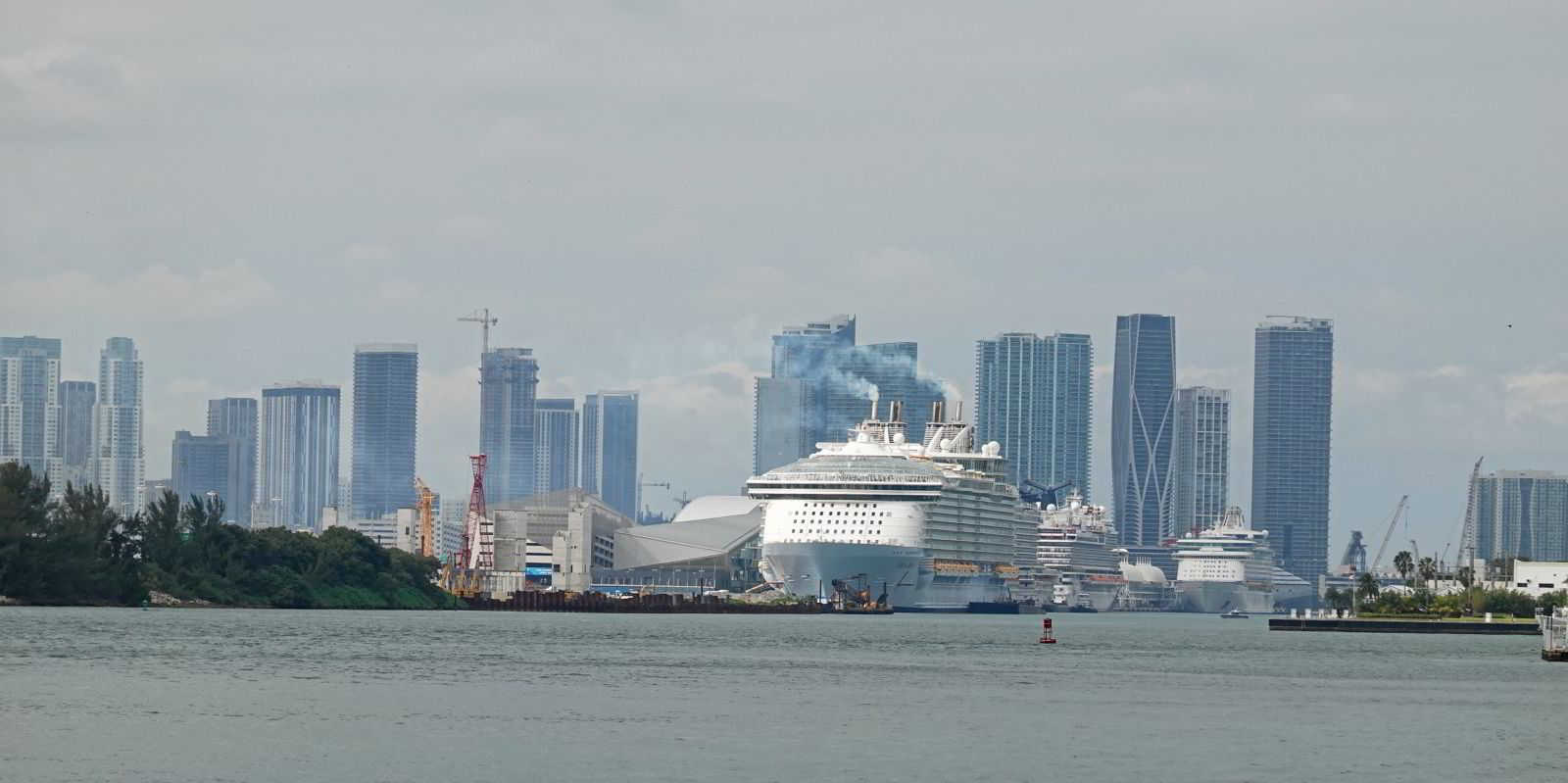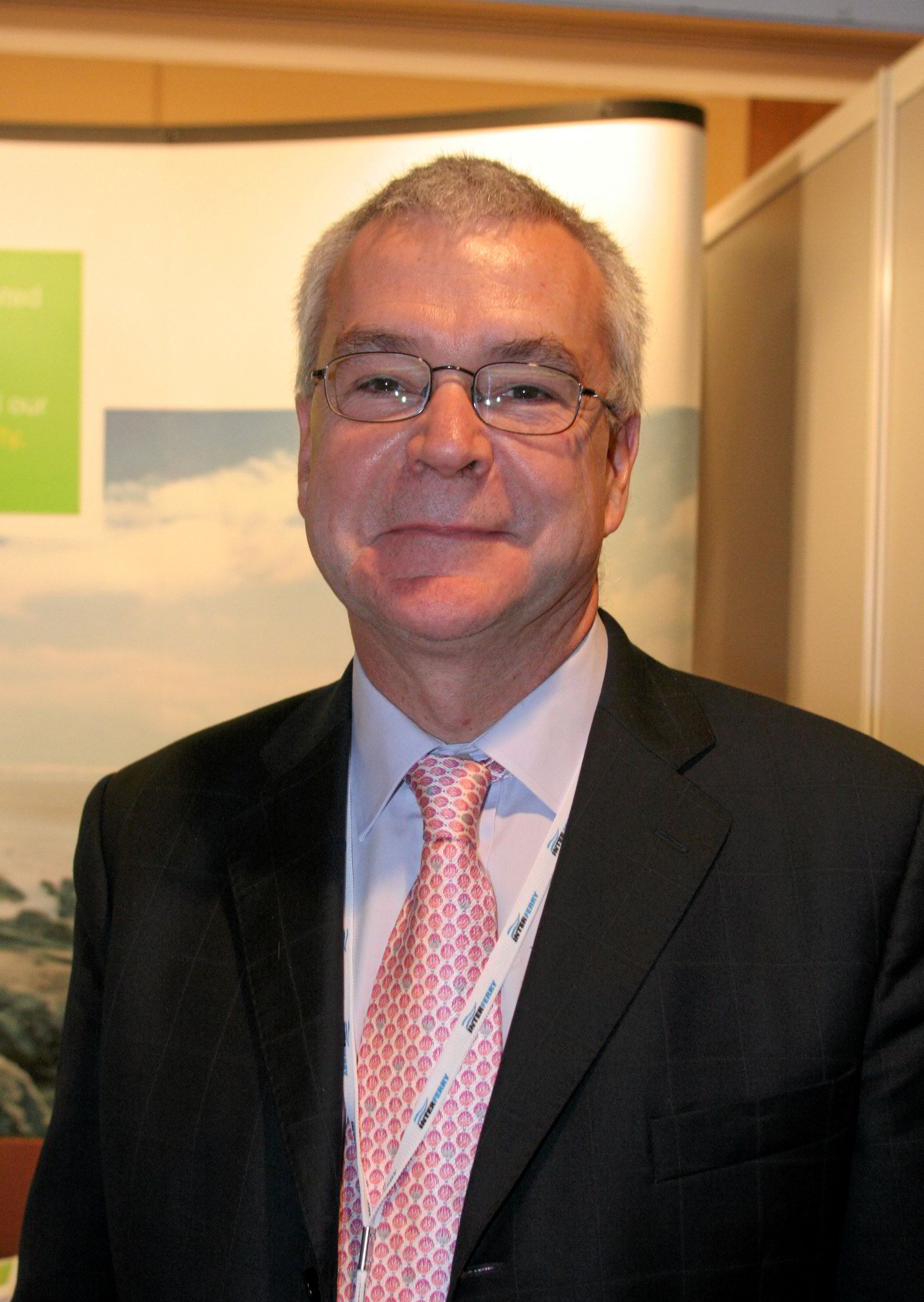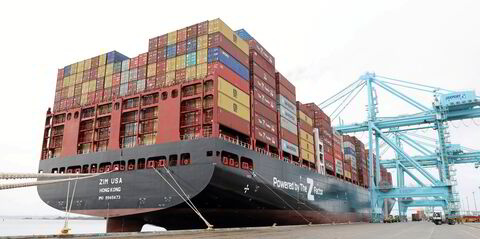As the International Maritime Organization made strides in setting tough decarbonisation targets for shipping this month, environmental groups were disappointed by a lack of progress on their calls for a ban on exhaust gas scrubbers.
The Clean Arctic Alliance said that the groups’ claims — asserting that IMO rules allowing uses of the devices an exception to the IMO ban on fuel sulphur content are in conflict with the UN Law of the Sea — have been referred to the UN shipping regulator’s legal division.
This week’s episode of the Green Seas podcast explores the debate in detail. Click the player above to listen, or on Google Podcasts, Apple Podcasts, Stitcher, Pandora, Spotify and Soundcloud.

Friends of the Earth, Greenpeace and other groups that make up the Clean Arctic Alliance complained to the IMO that scrubbers, while taking harmful sulphur oxides out of the exhaust that billows out of ships’ funnels, are putting dangerous substances into the sea. And they said that conflicts with the UN Convention on the Law of the Sea, which protects oceans from pollution.
Eelco Leemans, a technical advisor for the Clean Arctic Alliance, said he was disappointed that no progress was made at last week’s Marine Environment Protection Committee (MEPC) meeting toward a scrubber ban in sensitive areas like the Arctic.
“However, MEPC 79 has agreed that a paper submitted by Clean Arctic Alliance members identifying inconsistencies between the discharge of scrubber wastewater and the UN Law of the Sea Convention should be considered further by the IMO’s legal division,” he said.
“This is an important development since it is clear that the UN Convention on the Law of the Sea does not accept transforming one type of pollution into another form of pollution as scrubbers do.”
He said that in the meantime, IMO member states should ban scrubber discharge in their own waters and shipping should focus on low-sulphur fuels.
Scrubbers enter the scene
Scrubbers emerged from the global sulphur cap known as IMO 2020, which ratcheted down the content of sulphur oxides that was allowed in marine fuels to just 0.5%, and before that from emissions control areas that limited the pollutant in certain areas.
They were developed as a way to continue using what had long been shipping’s favourite fuel — heavy fuel oil — instead of lower-sulphur alternatives.

For makers of scrubbers and the shipping companies that use them, the devices are a sustainable way to continue using cheaper high-sulphur fuel oil (HFSO). They prevent sulphur pollution, and experts say the fuel actually has lower CO2 than the very low sulphur fuel oil that was developed to replace it in ships without scrubbers.
But three years after the scrubber cap, environmentalists remain concerned about other pollution associated with scrubbers.
‘Switching to greener fuels’
Lucy Gilliam, a senior shipping policy officer at environmental nonprofit Seas at Risk, said the scrubbers are not the way to deal with sulphur pollution.
“We should be switching to cleaner fuels. So our position is, come on, let’s be real about this,” she told the podcast.

“We’ve now seen all this other information that’s come out — studies on the toxic impacts of scrubber waste discharge. We’ve got various ports around the world that are banning scrubber waste discharge in their areas. Let’s be done with it. Let’s just ban them and get rid of them now.”
Scrubber industry group Exhaust Gas Cleaning System Association, or EGCSA, sees it differently. In an email, director Donald Gregory called the environmental groups’ claims “sensationalist”.
Last year, the EGCSA commissioned Danish Hydraulic Institute to carry out a toxicological report that found that scrubber discharges risk to the marine environment is at an acceptable level.
So why do environmental groups believe that the scrubber exception in IMO 2020 is in conflict with the Law of the Sea?
The convention, also known as UNCLOS, dates back to 1982 and provides a legal framework to protect the ocean environment.
The environmental groups pointed to a number of provisions in the Law of the Sea that they said conflict with the scrubber exemption in the global sulphur cap. Among them is an obligation by member states not to transfer pollution from one area to another, or to transform one type of pollution into another.
And they said scrubbers effectively do that, taking sulphur oxide emissions from the air and discharging them into the ocean as harmful sulphur compounds.
‘Ill thought out and counterproductive’
Gregory, head of the scrubber industry group, said the EGCSA cannot comment on the legal argument.
“All we can say about the angle of using UNCLOS as a tool to ban HSFO is that the strategy in our opinion is ill thought out and counterproductive,” he said.

The environmental groups claim that even though some scrubbers are closed-loop systems that do not discharge when in sensitive areas, those systems ultimately still pollute the ocean, just in higher concentrations.
Sam Davin, a senior specialist for marine conservation and shipping at World Wildlife Fund Canada, discussed that argument in a recent Clean Arctic Alliance webinar.
“All scrubbers – whether they’re open loop, closed loop or hybrid systems – all emit polluting effluent that contains heavy metals, nitrates and polycyclic aromatic hydrocarbons, or PAHs, that can accumulate in the environment and the food web and can negatively affect water quality, marine life and those who depend on the ocean for food security, economic security or cultural practices,” he said.
The effluent from open-loop systems can have acidity between pH 3 and Ph 5, he said, which far more acidic than the average of Ph 8.1 for surface sea water.
In areas with high scrubber use, their impact on sea water acidity can be more significant than ocean acidification caused by CO2 emissions, Davin said.
Dominating contaminant loads
Ida-Maja Hassellov, a professor of maritime environment at Chalmers University of Technology in Sweden, told the Clean Arctic Alliance webinar that a study using data recorded in 2018 found that contaminant loads in the Baltic Sea from 99 ships with scrubbers, particularly the open-loop variety, dominated loads in the waste streams from more than 8,000 ships overall.
Those included trace elements including nickel, selenium, vanadium and zinc, as well as PAHs.

Many more ships have been fitted with scrubbers since 2018.
And Hassellov said toxicological tests by the EU-funded EMERGE project, which is still under way, have found that scrubber water exposures had negative impacts on several organisms at different life stages.
“For example, sea urchins, copepods, mussels and micro-algae have been shown to have negative responses and the concentrations tested between 0.001% and 40% have all resulted in negative effects, and this is a bit surprising,” she said.
“For every new round of experiments with further dilutions, the toxicologist have still not found a concentration that is so low that it does not give a negative effect.”
However, that differs from the findings of the Danish Hydraulic Institute, which detected no toxicity in fish and only found toxicity in some tests with algae and crustaceans when there were high concentrations of scrubber effluent in the EGCSA-commissioned study.
Environmental groups also pointed to higher levels of other air pollutants from scrubbers, including CO2 and black carbon.

But the EGCSA’s Gregory pointed to a 2017 report by the International Council on Clean Transportation that said scrubbers can actually reduce black carbon. That same year, a Canadian submission to the IMO also ranked scrubbers as a better way to reduce black carbon than switching to distillate fuels, even though environmental groups have pointed to distillates as the preferred near-term solution.
Gregory also pointed to research by consultancy CE Delft, which found that ships with scrubbers have a 5% lower CO2 footprint compared to ships using low-sulphur fuel oil.
That means the use of low-sulphur fuel spurred by IMO 2020 has actually increased carbon emissions from shipping, he said.
Read more
- Editor’s Selection: Charterers slam CII clause, Vale launches Guiabamax tender, and is Japan’s leasing sector in danger?
- Green Seas: Scrubbers face questions as sulphur cap approaches three-year mark
- ‘Here we are once again’: Marshall Islands disappointed that IMO won’t adopt zero-carbon goal now
- Green Seas: After stops in Egypt and Brussels, shipping’s carbon debate turns to London
- Science Based Targets initiative ‘challenges’ shipowners to set targets to zero in 2040
- Green Seas: The EU has put a price on shipping’s carbon. What will the IMO do?


